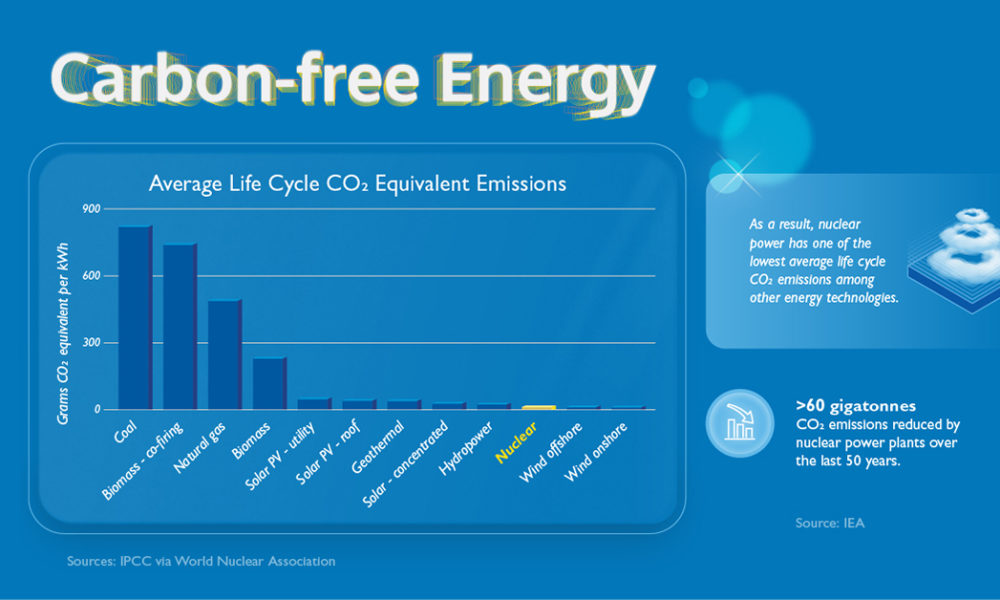Benefits of Nuclear Energy
Nuclear energy is a highly debated topic that has sparked conversations around the world. As the demand for clean and sustainable energy sources continues to rise, it is important to evaluate the benefits of nuclear energy. In this article, we will explore the advantages of nuclear energy and discuss why it should be considered as a viable option for meeting our energy needs.
Clean and Low Greenhouse Gas Emissions
Nuclear energy is often praised for its low greenhouse gas emissions. Unlike fossil fuels, such as coal or natural gas, nuclear power plants do not emit carbon dioxide or other harmful pollutants directly into the atmosphere during electricity generation. This makes nuclear energy a crucial player in the fight against climate change and global warming.
Reliable and Continuous Power Generation
One of the key benefits of nuclear energy is its ability to provide a reliable and continuous power supply. Nuclear power plants operate 24/7, ensuring a steady flow of electricity to meet the demands of industries, businesses, and households. This reliability is particularly important in areas where renewable energy sources, like solar or wind, may not be as consistent.
High Energy Density
Nuclear energy offers a high energy density, meaning that a small amount of nuclear fuel can produce a significant amount of energy. Compared to other energy sources, such as coal or natural gas, nuclear power is incredibly efficient. This high energy density allows nuclear power plants to generate large amounts of electricity while minimizing the need for extensive infrastructure and land use.
Fuel Availability and Independence
Unlike fossil fuels, which are finite resources, nuclear energy relies on uranium, which is widely available in various countries across the globe. This fuel availability ensures a stable and long-term energy supply, reducing dependence on foreign oil or gas imports. Additionally, advancements in nuclear technology have enabled the utilization of alternative fuels, such as thorium, further enhancing fuel availability and reducing reliance on specific resources.
Job Creation and Economic Growth
Nuclear energy projects have the potential to create a significant number of jobs and stimulate economic growth. The construction, operation, and maintenance of nuclear power plants require a skilled workforce, offering employment opportunities in various sectors. Additionally, the development of nuclear energy infrastructure contributes to local economies, attracting investments and fostering technological innovation.
Baseload Power and Grid Stability
Nuclear power plants provide baseload power, which means they can consistently generate a large amount of electricity over an extended period. This makes them suitable for meeting the base demand for electricity, ensuring grid stability, and reducing the risk of blackouts or power shortages. By diversifying the energy mix with nuclear power, countries can enhance the reliability and resilience of their electricity grids.
Research and Development Opportunities
Nuclear energy offers significant research and development opportunities. Advancements in nuclear technology can lead to improved safety measures, more efficient fuel usage, and the development of advanced reactor designs. Investing in nuclear research not only enhances the safety and performance of existing nuclear power plants but also paves the way for future innovations in the field of clean energy.

Nuclear energy presents numerous benefits, including low greenhouse gas emissions, reliable power generation, high energy density, fuel availability, job creation, and research opportunities. By harnessing the potential of nuclear energy, we can reduce our reliance on fossil fuels, mitigate climate change, and establish a sustainable energy future. It is crucial to continue exploring and investing in nuclear energy to unlock its full potential and ensure a cleaner and brighter future for generations to come.
Frequently Asked Questions about the Benefits of Nuclear Energy
1. What are the advantages of nuclear energy?
Nuclear energy has several advantages, including:
Low greenhouse gas emissions
Reliable power generation
High energy density
Continuous power supply
2. How does nuclear energy contribute to reducing carbon emissions?
Nuclear power plants produce electricity without emitting carbon dioxide or other greenhouse gases, helping to mitigate climate change.
3. Is nuclear energy a sustainable source of power?
Yes, nuclear energy is considered sustainable as it has a virtually unlimited fuel supply. Uranium, the primary fuel used in nuclear reactors, is abundant on Earth.
4. What role does nuclear energy play in meeting global energy demands?
Nuclear power provides a significant portion of the world’s electricity, helping to meet the increasing energy demands of growing populations.
5. Are nuclear power plants safe?
Yes, nuclear power plants are designed with multiple safety layers to prevent accidents and protect the environment and public health. Stringent regulations and continuous monitoring ensure their safety.
6. Can nuclear energy help in reducing dependence on fossil fuels?
Absolutely. By generating electricity without burning fossil fuels, nuclear energy helps reduce the reliance on coal, oil, and natural gas, thus decreasing air pollution and dependence on finite resources.
7. What are the economic benefits of nuclear energy?
Nuclear power plants create jobs during the construction, operation, and maintenance phases. Additionally, they provide a stable and cost-effective source of electricity, reducing price volatility.
8. How does nuclear energy compare to renewable energy sources?
Nuclear energy and renewable sources like wind and solar power are complementary. While renewables are intermittent, nuclear power provides a reliable and constant electricity supply, making them a valuable combination for a sustainable energy mix.
9. Are there any health risks associated with nuclear energy?
The health risks associated with nuclear energy are minimal. Strict safety measures and regulations ensure that radiation exposure to workers and the public remains well below harmful levels.
10. What is the potential for nuclear energy in reducing air pollution?
Nuclear power produces electricity without emitting air pollutants such as sulfur dioxide, nitrogen oxides, and particulate matter, thereby contributing to cleaner air and improved public health.




